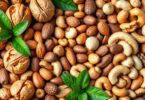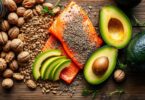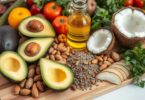“The first wealth is health.” – Ralph Waldo Emerson
In the quest for optimal health and wellness, the significance of healthy fats cannot be overstated. Not all fats are equal; certain fat-rich foods are vital for a balanced, nutrient-dense diet. Ralph Waldo Emerson’s wisdom, “The first wealth is health,” underscores the importance of these foods. By integrating them into our lives, we unlock the path to vibrant well-being.
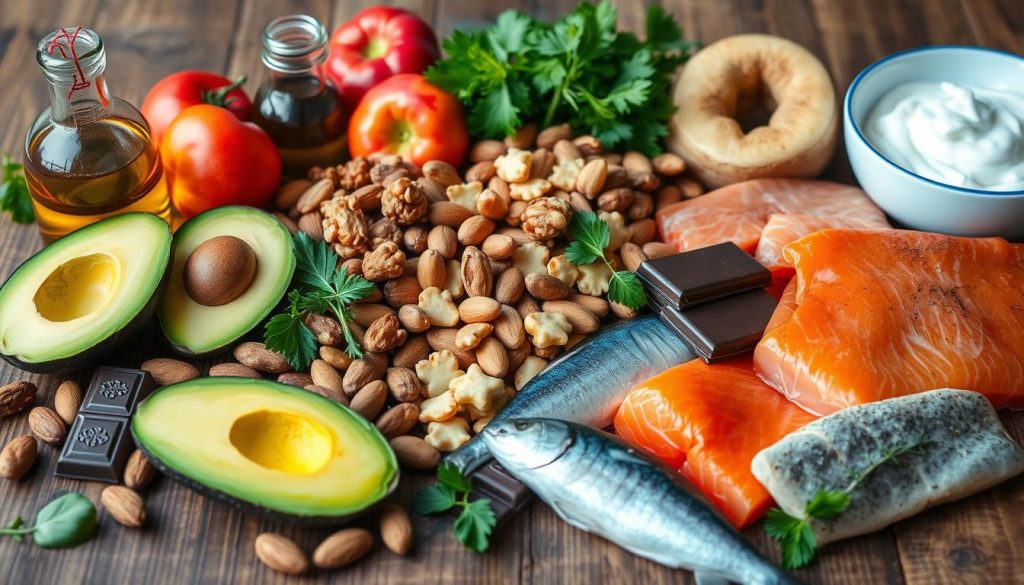
Key Takeaways
- Healthy fats are crucial for maintaining overall health and well-being.
- Certain fat-rich foods, such as avocados, nuts, seeds, and fatty fish, are nutrient-dense and provide essential benefits.
- Incorporating a variety of fat-rich foods into your diet can improve cardiovascular health, brain function, and weight management.
- Understanding the different types of dietary fats and their roles in the body is essential for making informed choices.
- Proper portion control and preparation methods are important when consuming fat-rich foods.
Understanding the Role of Healthy Fats in Your Diet
In the realm of nutrition, grasping the nuances of dietary fats is paramount. These fats, not inherently good or bad, manifest in various forms, each with distinct benefits and roles. Their consumption is a cornerstone of a balanced diet.
Different Types of Dietary Fats
The dietary fat spectrum includes monounsaturated fats, polyunsaturated fats, and saturated fats. Monounsaturated fats, prevalent in avocados, nuts, and olive oil, are associated with enhanced heart health and diminished inflammation. Polyunsaturated fats, found in fatty fish, seeds, and certain plant oils, are vital for brain function and cell proliferation. Saturated fats, often maligned, contribute positively in moderation, supporting hormone synthesis and immune function.
Why Your Body Needs Healthy Fats
Essential fatty acids, including omega-3s and omega-6s, are indispensable for various bodily processes, such as cardiovascular health, cognitive function, and inflammation management. They facilitate the absorption of fat-soluble vitamins A, D, E, and K. Moreover, fats serve as an energy source and enhance satiety, playing a pivotal role in a well-rounded diet.
Daily Fat Requirements and Guidelines
The daily fat intake recommendation spans 20-35% of total calories, emphasizing monounsaturated and polyunsaturated fats. Yet, these recommendations are not one-size-fits-all, influenced by factors like activity level, age, and health status. Seeking guidance from a healthcare professional is essential to tailor fat intake to individual needs.
| Fat Type | Recommended Daily Intake |
|---|---|
| Monounsaturated Fats | 15-20% of total calories |
| Polyunsaturated Fats | 6-10% of total calories |
| Saturated Fats | Less than 10% of total calories |
By comprehending the significance of healthy fats in your diet, you empower yourself to make informed dietary choices. This knowledge enables you to harness the myriad benefits these fats offer, thereby enhancing your overall well-being.
The Science Behind Fat-Rich Foods and Nutrition
The significance of healthy fats in a balanced diet is paramount. These nutrients are vital for heart health and skin vitality. Exploring the science behind fat-rich foods reveals their profound impact on our nutrition.
Heart Health and Cholesterol Management
Monounsaturated and polyunsaturated fats are crucial for heart health. They help manage cholesterol levels, reducing LDL (bad) cholesterol and boosting HDL (good) cholesterol. Omega-3 fatty acids, found in fatty fish, exhibit anti-inflammatory properties, enhancing cardiovascular well-being.
Anti-Inflammatory Benefits
Anti-inflammatory fats in avocados, nuts, and olive oil combat body inflammation. Chronic inflammation is linked to various health issues, including arthritis and certain cancers. Adding these fatty acids to your diet can enhance overall well-being and skin health.
| Nutrient | Benefits | Food Sources |
|---|---|---|
| Omega-3 Fatty Acids | Heart health, anti-inflammatory properties | Fatty fish (salmon, mackerel, sardines), walnuts, chia seeds, flaxseeds |
| Monounsaturated Fats | Cholesterol management, heart health | Avocados, olive oil, almonds, peanuts |
| Polyunsaturated Fats | Cholesterol management, brain health | Fatty fish, sunflower seeds, safflower oil, soybean oil |
Incorporating a range of fat-rich foods into your diet can significantly benefit your health. These foods support heart health and reduce inflammation, highlighting the importance of healthy fats in a nutritious diet.
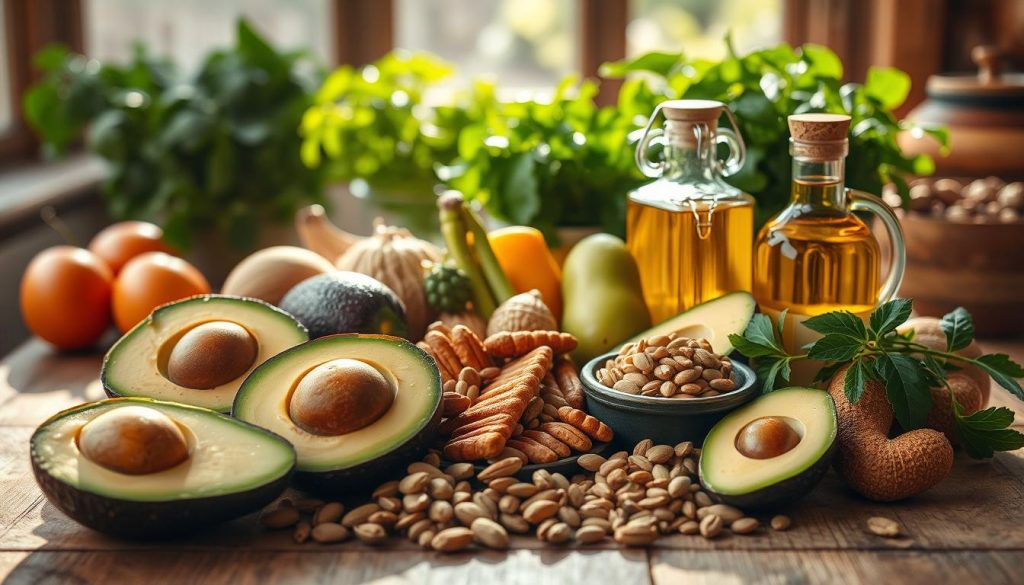
Avocados: Nature’s Creamy Powerhouse
Avocados are celebrated as a superfood, and their reputation is well-deserved. These creamy, nutrient-dense fruits are loaded with essential vitamins, minerals, and, notably, healthy fats. Understanding their nutritional profile and versatility can aid in integrating them into a balanced, fat-rich diet.
Nutritional Profile of Avocados
Avocados are known for their high-fat content, with a medium-sized fruit containing nearly 15 grams of fat. The majority of this fat is monounsaturated, a type beneficial for heart health, making avocados a prime choice for fat-rich foods for weight loss. Beyond their avocado fat content, they are also a source of fiber, vitamins C, E, K, and B6, and minerals like potassium, magnesium, and copper.
Creative Ways to Include Avocados in Meals
- Serve sliced avocado on toast or in salads for a creamy, nutrient-dense addition.
- Blend avocado into smoothies or use it as a replacement for mayonnaise or sour cream in dips and dressings.
- Stuff avocado halves with grilled shrimp, chicken, or a veggie-based filling for a satisfying, avocado health benefits-packed meal.
- Bake avocado fries or roast avocado wedges for a unique and flavorful side dish.
Storage and Ripening Tips
To keep your avocados fresh and ready, store unripe ones at room temperature until they ripen. Once ripe, refrigerate them to slow down the ripening. When choosing avocados, select ones without bruises and that yield slightly to pressure.
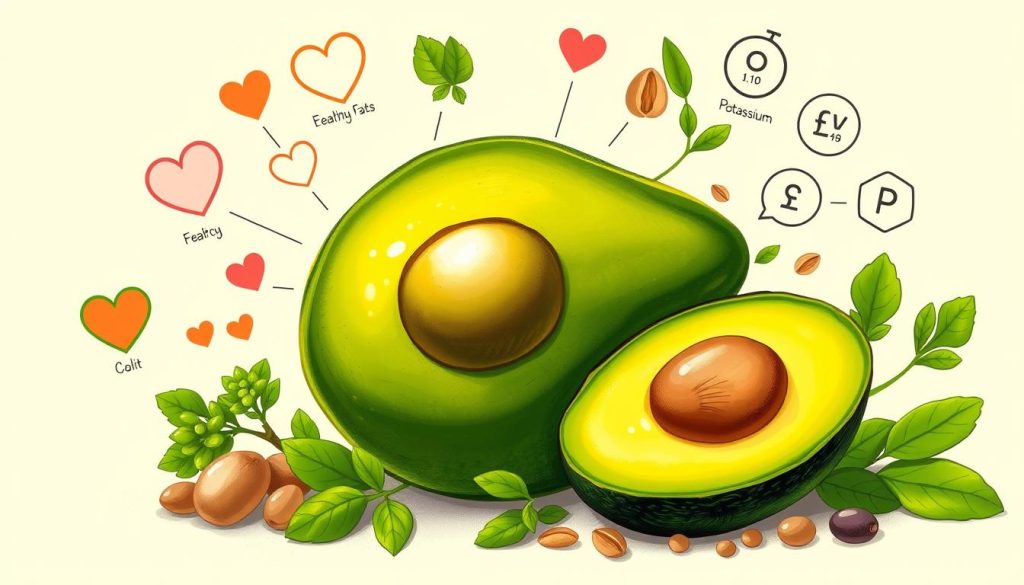
Including foods high in healthy fats like avocados in your diet can be both delicious and nutritious. By exploring the versatility of this creamy fruit, you’ll discover numerous ways to enjoy its avocado health benefits throughout the day.
Nuts and Seeds: Compact Sources of Healthy Fats
Nuts and seeds are essential for adding healthy fats to your diet. These small, nutrient-rich foods are packed with beneficial lipids that enhance overall health. They contain a variety of fats, from the heart-healthy monounsaturated fats in nuts for healthy fats to the omega-3 richness of flaxseeds omega-3. These ingredients provide numerous nutritional benefits.
Walnuts for healthy fats stand out for their high omega-3 content. Consuming just a handful of walnuts can significantly increase your intake of these essential fatty acids. These fats are crucial for brain function and heart health. Chia seeds healthy fats, meanwhile, are celebrated for their high fiber and antioxidant content. They are an excellent addition to smoothies, salads, and baked goods.
| Nut/Seed | Key Healthy Fats | Nutritional Benefits |
|---|---|---|
| Walnuts | Omega-3 ALA | Heart health, brain function |
| Flaxseeds | Omega-3 ALA | Anti-inflammatory, antioxidant |
| Chia Seeds | Omega-3 ALA, fiber | Digestive health, weight management |
| Almonds | Monounsaturated fats | Skin health, blood sugar regulation |
| Sunflower Seeds | Vitamin E, linoleic acid | Immune function, skin health |
Adding a variety of nuts and seeds healthy fats to your diet is a simple yet effective way to enhance your nutrient intake. These versatile ingredients can be enjoyed as a snack, sprinkled on salads, or blended into smoothies. They can significantly improve the healthiness of any meal or snack.

Omega-3 Rich Fish: From Ocean to Plate
For those aiming to enhance their intake of healthy fats, fatty fish varieties rich in omega-3 fatty acids are an excellent option. These nutrient-dense ocean dwellers not only offer a delightful culinary experience but also provide numerous health benefits. These include increased energy levels and improved heart health.
Best Fish Varieties for Healthy Fats
Certain fish are particularly noted for their omega-3 content, making them top picks for those seeking these nutrients. These include:
- Salmon
- Mackerel
- Sardines
- Herring
- Trout
These fatty fish are abundant in essential omega-3 fatty acids, such as EPA and DHA. These acids are vital for maintaining overall well-being.
Recommended Serving Sizes
To maximize the benefits of omega-3 rich fish, health experts advise consuming them at least twice a week. The recommended serving size is typically 3-4 ounces of cooked fish. This amount provides a substantial dose of these healthy fats.
Preparation Methods
When preparing fatty fish, it’s crucial to use cooking methods that preserve the delicate omega-3s. Grilling, baking, and poaching are excellent choices as they retain the fish’s natural flavors and nutritional properties. High heat from frying can degrade the beneficial fats, so it’s best avoided.
| Fish Variety | Omega-3 Content (per 3.5 oz serving) |
|---|---|
| Salmon | 2.2 grams |
| Mackerel | 3.0 grams |
| Sardines | 1.9 grams |
| Herring | 1.8 grams |
| Trout | 1.6 grams |
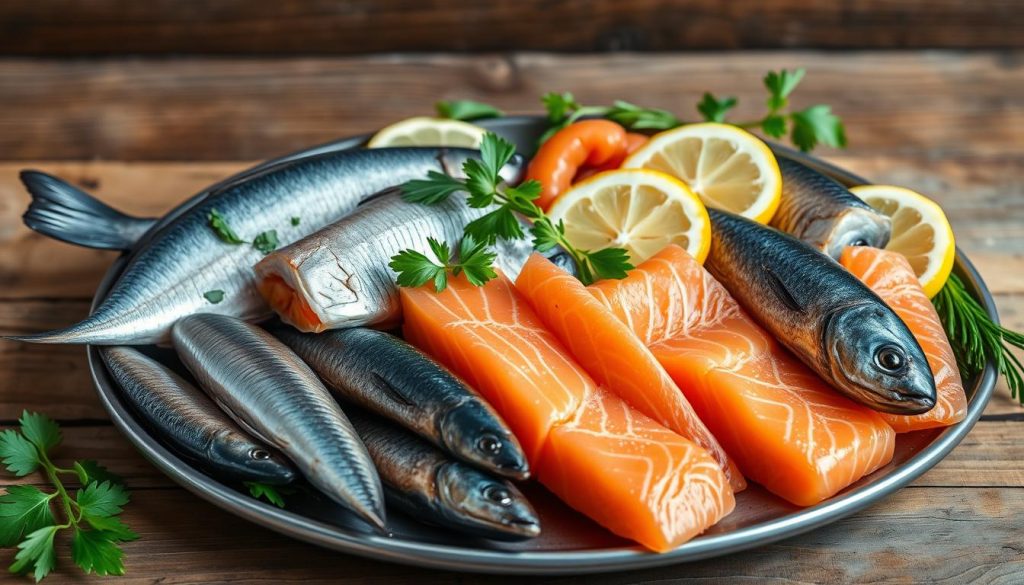
Incorporating these omega-3 rich fish into your diet can significantly enhance your intake of healthy fats. This boost supports your energy, heart health, and overall well-being.
Olive Oil: Mediterranean Gold for Health
Olive oil stands out as the premier choice among healthy cooking oils. It is a cornerstone of the Mediterranean diet, celebrated for its profound health benefits. This golden liquid transcends its role as a flavor enhancer, serving as a nutrient-dense powerhouse that can significantly enhance your well-being.
Its high content of monounsaturated fats, particularly oleic acid, is a key factor in its health benefits. Research has consistently shown that olive oil can lower cholesterol levels, reduce heart disease risk, and support blood sugar health. This makes it an essential component of a balanced diet.
Beyond its fat content, olive oil is also a treasure trove of antioxidants, such as polyphenols. These compounds help combat inflammation and shield cells from oxidative damage. Thus, olive oil is a crucial element in any Mediterranean-style diet rich in healthy fats.
In the kitchen, olive oil’s versatility and flavor make it an ideal choice. Its high smoke point allows for a wide range of cooking techniques, from sautéing and roasting to dressing salads and dipping bread. Its distinct aroma and taste can transform even the most basic dishes into culinary masterpieces.
For those aiming to enrich their diet with healthy oils for cooking or foods high in healthy oils, olive oil is indispensable. Embrace the Mediterranean lifestyle and allow this golden elixir to nourish both your taste buds and your overall health.

Coconut Products: Tropical Fat-Rich Foods
Coconut and its products are gaining traction as a healthy fat source in nutrition. The acclaimed coconut oil and versatile coconut-based items are rich in benefits. They are ideal for those aiming to add more coconut fat benefits to their diet.
Coconut Oil Uses and Benefits
Coconut oil’s unique fatty acid profile has drawn significant attention. It is predominantly composed of medium-chain triglycerides (MCTs), a type of saturated fat. This makes it a preferred choice for ketogenic fat-rich foods diets, aiding in fat-burning and energy production.
Its versatility extends beyond cooking. Coconut oil is celebrated for its skin and hair benefits, making it a staple in best oils for healthy cooking personal care. It moisturizes skin and nourishes hair, solidifying its status as a tropical fat-rich superstar.
Other Coconut-Based Products
Coconut’s popularity has spawned a variety of coconut-based products, each with its own coconut fat benefits. Coconut milk, flour, and butter are just a few examples. These ingredients can enhance a healthy, balanced diet.
Whether you’re interested in coconut oil nutrition or exploring other coconut products, this superfood is a valuable addition. It enriches any fat-rich pantry.

Full-Fat Dairy: Benefits and Choices
In the ever-evolving world of nutrition, full-fat dairy products have regained the spotlight, shedding light on their often-overlooked benefits. From the creamy richness of grass-fed butter to the versatility of ghee, these fat-rich dairy options can play a vital role in a balanced, healthy diet.
Contrary to popular belief, full-fat dairy can be a nutrient-dense addition to your daily routine. These products are not only a source of high-quality healthy fats, but they also contain essential vitamins and minerals, such as calcium, vitamin A, and vitamin K2. Incorporating them into your meals and snacks can support overall well-being, including bone health and metabolic function.
The Benefits of Grass-Fed Butter
Grass-fed butter stands out for its exceptional nutritional profile. Compared to its conventional counterpart, it boasts a higher concentration of conjugated linoleic acid (CLA), a type of fat that has been linked to potential benefits for weight management and immune function. Additionally, grass-fed butter is rich in omega-3 fatty acids, which are essential for brain health and inflammation regulation.
Exploring the Versatility of Ghee
Ghee, a clarified form of butter, offers a unique set of advantages. With its high smoke point, ghee is an excellent choice for high-heat cooking, making it a versatile option for sautéing, roasting, and even baking. Moreover, ghee has a lower fat content compared to regular butter, making it a potentially healthier alternative for those seeking to manage their fat intake.
Embracing the benefits of full-fat dairy can be a simple yet impactful step towards a more nourishing diet. By thoughtfully incorporating these healthy fat sources into your meals and snacks, you can unlock a world of culinary possibilities while supporting your overall well-being.
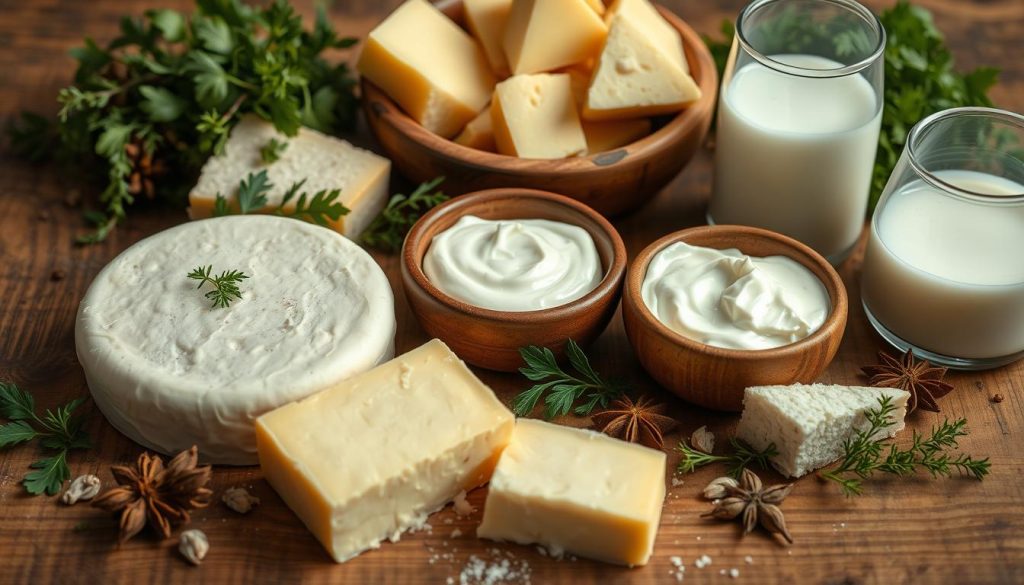
Plant-Based Sources of Healthy Fats
The plant kingdom is a treasure trove of plant-based fats, offering a wealth of nutrients for our bodies. These whole foods healthy fats are essential for our well-being. They provide a range of essential nutrients, enhancing our health.
Legumes and Beans
Legumes, such as soybeans, lentils, and chickpeas, are rich in plant-based fats. They are not only a good source of protein but also contain beneficial fats like omega-3 alpha-linolenic acid (ALA). Adding legumes and beans to your meals can be a tasty way to increase your intake of healthy fats.
Seeds and Their Oil Content
Seeds are tiny nutritional powerhouses, packed with whole foods healthy fats. Flaxseeds, chia seeds, hemp seeds, and pumpkin seeds are just a few examples. They are rich in beneficial fats, including flax oil health benefits and chia seeds fat content. Including a variety of seeds in your diet can provide a significant amount of plant-based omega-3s and other essential fatty acids.
| Seed | Fat Content (per 1 tbsp) | Omega-3 Content |
|---|---|---|
| Flaxseed | 4.3 g | 2.4 g |
| Chia Seed | 5 g | 2.5 g |
| Hemp Seed | 5 g | 0.3 g |
| Pumpkin Seed | 5 g | 0.1 g |
By incorporating a variety of plant-based fats from legumes, beans, and seeds, you can enjoy the numerous health benefits of these nutrient-dense whole foods.
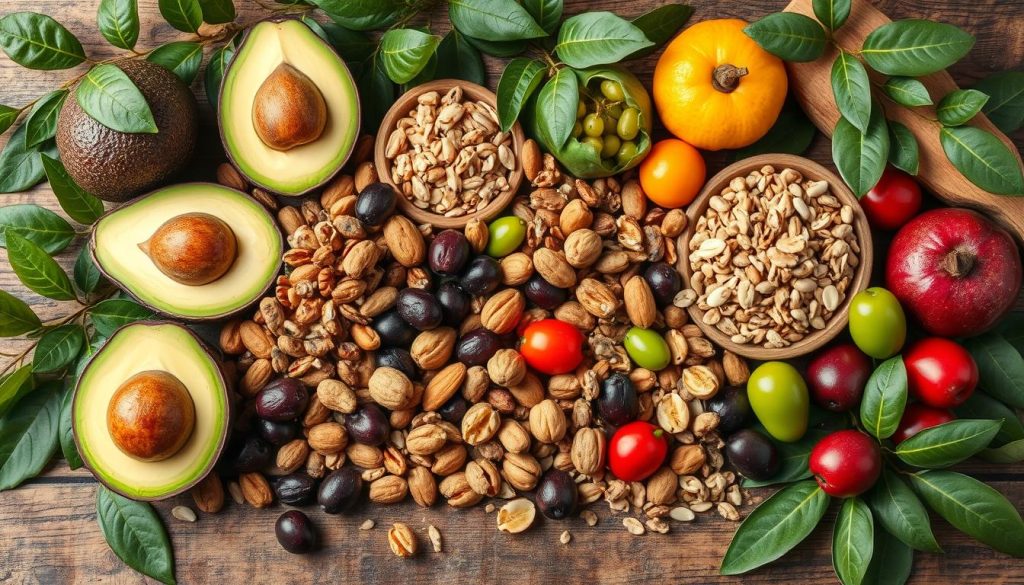
Cooking with Healthy Fats: Tips and Techniques
The selection of fats and oils significantly impacts healthy cooking. Choosing the right healthy oils for cooking and fat-rich foods for detox enhances flavor and offers nutritional benefits. Discover these tips and techniques to harness the benefits of best oils for healthy cooking and how to add healthy fats to your diet.
Choosing the Right Oils
Not all oils are equal. For high-heat cooking, select oils with a high smoke point, such as avocado oil, refined olive oil, or grapeseed oil. These oils can handle intense heat without degrading and releasing harmful substances. For lower heat, extra-virgin olive oil, coconut oil, and nut oils like walnut or almond oil are ideal.
Incorporating Fat-Rich Foods
- Toss roasted vegetables in a drizzle of olive oil or avocado oil for a rich, satisfying flavor.
- Add slices of avocado or a sprinkle of nuts and seeds to your salads and grain bowls.
- Sauté leafy greens in coconut oil for a delicious and nutritious side dish.
Detoxifying with Healthy Fats
Certain healthy fats, such as those in omega-3-rich fish and extra-virgin olive oil, have detoxifying properties. Include these fat-rich foods in your meals to aid your body’s detoxification processes and enhance overall health.
| Oil | Smoke Point | Best Uses |
|---|---|---|
| Avocado Oil | 520°F (271°C) | High-heat cooking, baking, sautéing |
| Extra-Virgin Olive Oil | 375-400°F (191-204°C) | Low-to-medium heat cooking, dressings, drizzling |
| Coconut Oil | 350°F (177°C) | Baking, sautéing, medium-heat cooking |
Understanding the unique properties of different healthy oils and incorporating fat-rich foods for detox into your cooking unlocks the full potential of healthy oils for cooking and how to add healthy fats to your diet. Experiment with these techniques to enhance the flavor and nutrition of your meals.

Healthy Fat Snacks for On-the-Go
In today’s fast-paced environment, having nutritious snack options is crucial. These snacks should fuel your body and maintain energy levels throughout the day. Healthy fats offer numerous delicious, convenient choices perfect for on-the-go consumption. They not only curb hunger but also enhance a balanced diet and support muscle growth.
Quick and Easy Fat-Rich Snack Ideas
- Creamy avocado toast with a sprinkle of sea salt
- Handful of mixed nuts, such as almonds, walnuts, and cashews
- Hard-boiled eggs with a drizzle of olive oil and a pinch of black pepper
- Greek yogurt topped with chia seeds and a touch of honey
- Sliced cucumber or celery sticks with a smooth nut butter
- Coconut-chia pudding made with full-fat coconut milk
Portion Control Guidelines
Controlling portions is vital when consuming high-fat snacks to maintain a balanced diet. Aim for serving sizes of about 1-2 tablespoons of nut butter, 1/4 cup of nuts, or 1/2 of a medium avocado. These sizes offer a satisfying amount of healthy fats without overindulgence. Remember, moderate consumption of these fat-rich foods can aid in muscle gain and overall health.
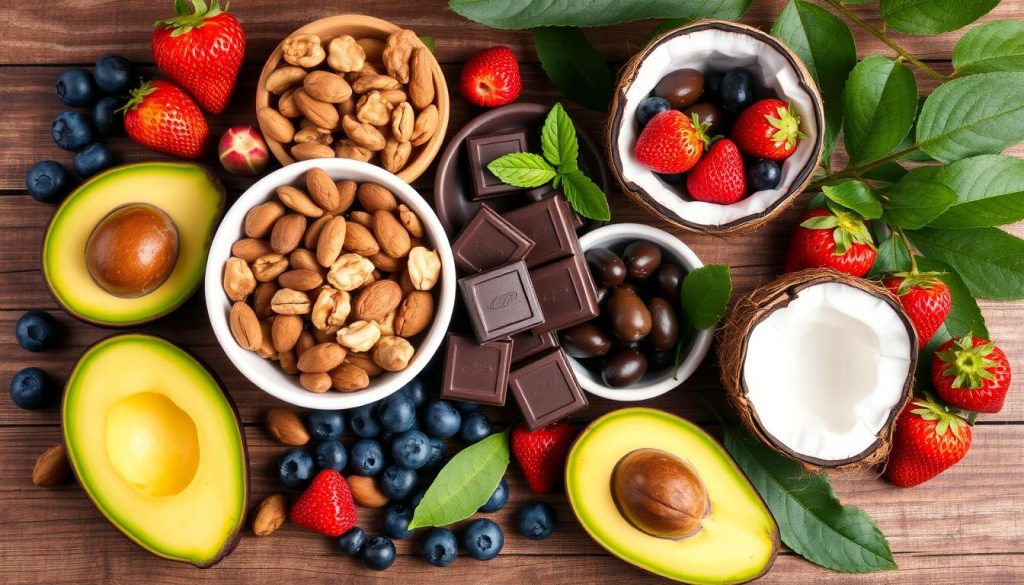
“Healthy fats are essential for your body’s proper functioning and can even aid in weight management when consumed in the right portions.”
Brain-Boosting Benefits of Healthy Fats
Incorporating healthy fats into your diet profoundly impacts your brain health. These essential fatty acids, especially omega-3s, are vital for cognitive function, memory, and reducing neurodegenerative disease risks.
Omega-3 fatty acids, found in fatty fish, walnuts, and flaxseeds, support brain development and function. They maintain brain cell membrane structure and flexibility, enhancing neuron communication. Moreover, these brain-boosting fats reduce inflammation, which can slow cognitive decline.
Integrating healthy fats for brain health into your daily routine is straightforward. Swap unhealthy fats for nutrient-dense options. Add walnuts to your oatmeal or enjoy salmon a few times a week. Avocados, olive oil, and full-fat dairy are also rich in essential fatty acids for health.
“Healthy fats are essential for optimal brain function and development. Incorporating them into your diet can have a significant impact on your cognitive abilities.”
By choosing to include brain-boosting fats in your meals and snacks, you support your mental well-being. This can potentially reduce age-related cognitive decline. A balanced diet rich in omega-3 foods and other healthy fats is crucial for a sharp, healthy brain.
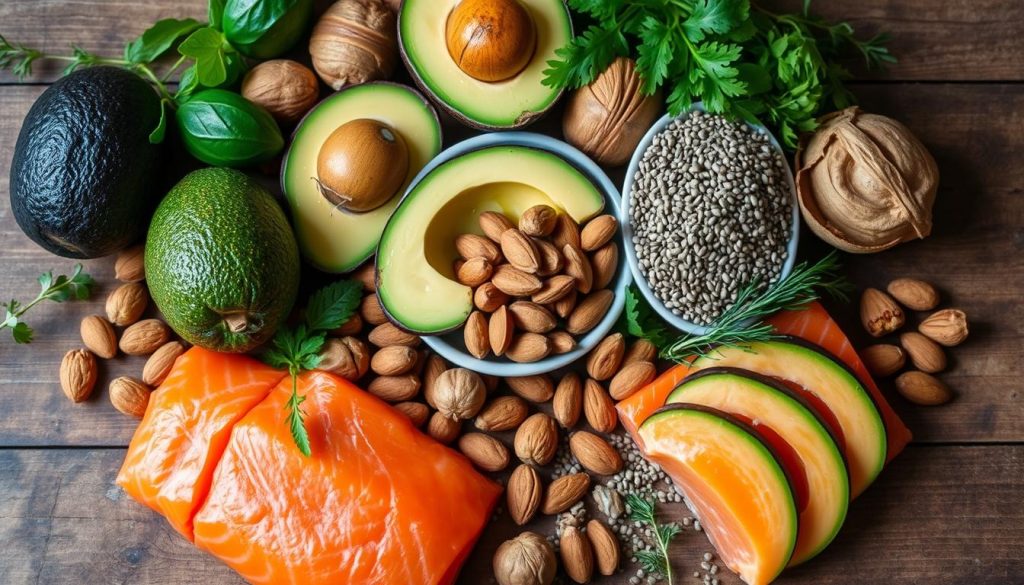
Fat-Rich Foods for Weight Management
The significance of healthy fats in weight management is often underestimated. Not all fats are equal; the right fats for weight loss, fat-burning foods, and fat-burning superfoods can transform your health and fitness goals.
How Healthy Fats Aid Weight Loss
Healthy fats, like those in avocados, nuts and seeds, and fatty fish, aid in weight loss. They promote satiety, enhance metabolism, and regulate hormones. These best fats for metabolism keep you full, preventing overeating and unhealthy snacking.
Portion Control Strategies
- Integrate healthy fat-rich foods into your diet, but control portions. A quarter of an avocado or a small handful of nuts can be a nutritious fat boost.
- Prefer high-quality, unprocessed fats like extra-virgin olive oil, coconut oil, or avocado oil for cooking and dressings, avoiding butter or margarine.
- Include fatty fish like salmon, tuna, or mackerel a few times a week for heart-healthy omega-3 fatty acids.
Incorporating fats for weight loss, fat-burning foods, and fat-burning superfoods into your diet supports weight management. It also brings numerous health benefits of healthy fats.
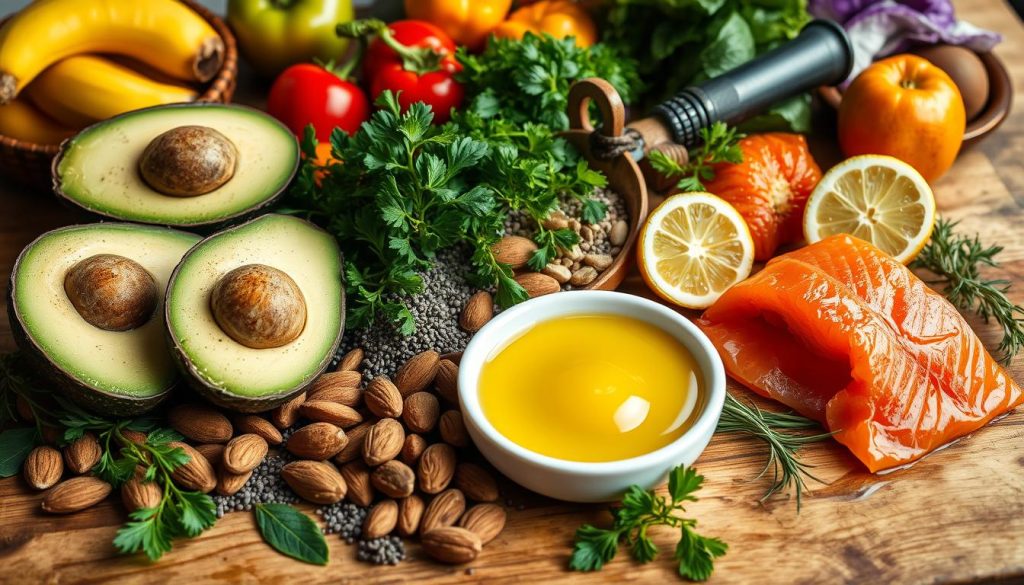
Common Myths About Dietary Fats
Many misconceptions surround dietary fats, yet scientific evidence reveals a different reality. The role of healthy fats in our diets is more nuanced than commonly believed. Let’s delve into these myths and uncover the truth about heart-healthy fats.
Myth: All Saturated Fats Are Unhealthy
It’s acknowledged that some saturated fats can contribute to heart disease. However, not all saturated fats are detrimental. Certain saturated fats, like those in coconut oil, can actually provide benefits for heart health. The focus should be on healthy fats for heart health. Consuming saturated fats in moderation, as part of a balanced diet, is key.
Myth: Dietary Cholesterol Causes High Blood Cholesterol
For years, we’ve been cautioned against dietary cholesterol. However, recent research indicates a more intricate relationship between dietary cholesterol and blood cholesterol levels. For most individuals, dietary cholesterol has little impact on blood cholesterol levels. The true culprits are often processed foods, refined carbs, and unhealthy fats.
Myth: Unsaturated Fats Are the Only Healthy Fats
Unsaturated fats, found in avocados, nuts, and olive oil, are undoubtedly beneficial. However, not all saturated fats are inherently bad. Saturated fats support brain health, hormone production, and immune function. The goal is to balance your intake of all healthy fat sources within a nutritious diet.
| Myth | Fact |
|---|---|
| All saturated fats are unhealthy | Some saturated fats, like those in coconut oil, can benefit heart health |
| Dietary cholesterol causes high blood cholesterol | Dietary cholesterol has little impact on blood cholesterol for most people |
| Unsaturated fats are the only healthy fats | Saturated fats can also offer health benefits when consumed in moderation |
By dispelling these myths, you can make more informed choices about incorporating heart-healthy fat sources into your diet. Enjoy the numerous benefits of healthy fats for heart health.
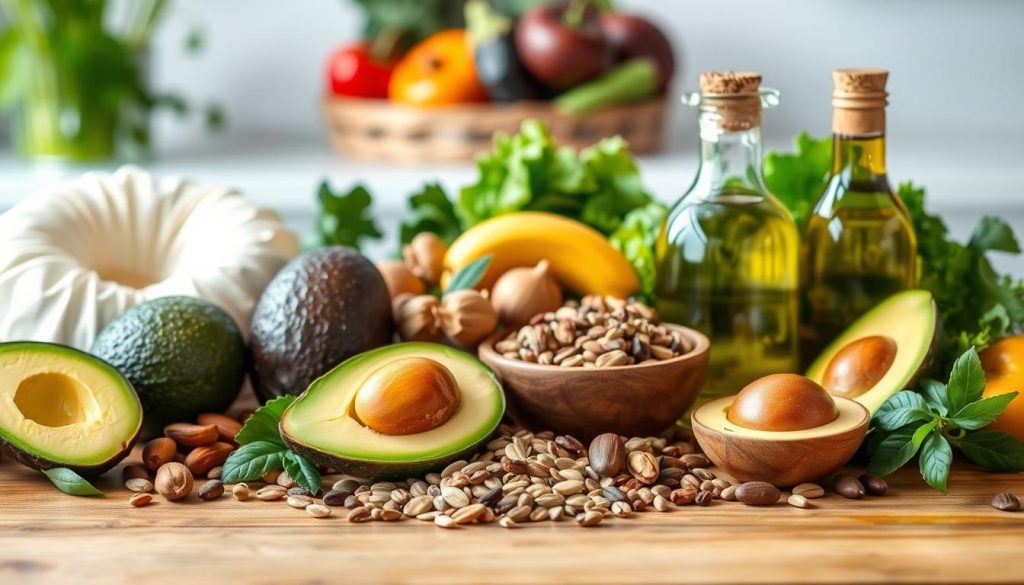
Shopping Guide for Fat-Rich Foods
Understanding how to incorporate healthy fats into your diet is crucial. This guide will equip you with the knowledge to navigate the grocery store effectively. You’ll learn how to select the best fat-rich foods, enhancing your health and wellness.
What to Look for on Labels
While shopping, scrutinize the nutrition labels of potential purchases. Seek out products rich in monounsaturated and polyunsaturated fats. Examples include avocados, nuts, seeds, and fatty fish like salmon. Conversely, avoid foods high in saturated and trans fats, which can harm your health.
It’s also important to consider serving sizes. Adjust your portions to align with your daily fat intake goals. This ensures you benefit from these essential nutrients without overdoing it.
Storage Tips for Fat-Rich Foods
Proper storage is vital to maintain the quality and nutritional value of your fat-rich foods. Store nuts, seeds, and nut butters in airtight containers in a cool, dark location. This prevents oxidation and spoilage. For items like fatty fish, avocados, and coconut products, refrigeration or freezing extends their shelf life.
Remember to check expiration dates. Consuming these foods before they expire guarantees you reap the most health benefits from their fat content.
FAQ
What are the different types of dietary fats?
Dietary fats are categorized into monounsaturated, polyunsaturated, and saturated fats. Monounsaturated fats are abundant in avocados, nuts, and olive oil. Polyunsaturated fats are found in fatty fish, seeds, and certain plant oils. Saturated fats are present in full-fat dairy, meat, and some plant-based oils.
Why does the body need healthy fats?
Healthy fats are essential for energy, cell growth, and vitamin absorption. They also regulate inflammation, support heart health, and enhance brain function.
What are the daily fat requirements and guidelines?
Adults should consume 20-35% of their daily calories from fat. The exact amount varies based on age, activity level, and health goals.
How do healthy fats contribute to heart health?
Omega-3 fatty acids in fatty fish can lower cholesterol, reduce inflammation, and promote cardiovascular health. They also help manage blood pressure and lower heart disease risk.
What are the health benefits of avocados?
Avocados are rich in monounsaturated fats, which can improve cholesterol levels. They also contain antioxidants, fiber, and essential vitamins and minerals.
How can I incorporate more nuts and seeds into my diet?
Add nuts and seeds to salads, yogurt, oatmeal, or enjoy them as snacks. Walnuts, almonds, chia seeds, and flaxseeds are excellent choices.
What are the best fish varieties for obtaining healthy omega-3 fats?
Salmon, mackerel, sardines, and tuna are rich in omega-3 fatty acids. Aim for 2-3 servings weekly for their health benefits.
What are the health benefits of olive oil?
Olive oil, a key Mediterranean diet component, is rich in monounsaturated fats. It reduces heart disease risk, improves cholesterol, and has anti-inflammatory effects. It’s a versatile cooking oil.
What are the benefits of incorporating coconut products into my diet?
Coconut oil and products contain medium-chain triglycerides (MCTs) for quick energy and weight management. They also have lauric acid, beneficial for antimicrobial and antiviral properties.
Are there benefits to consuming full-fat dairy products?
Yes, full-fat dairy like grass-fed butter, ghee, and yogurt offer vitamins A and D, and healthy saturated fats. They can be part of a balanced diet.
What are some plant-based sources of healthy fats?
Avocados, olives, coconut, and legumes are plant-based sources of healthy fats. They provide unsaturated fats, fiber, vitamins, and minerals.
How can I incorporate more healthy fats into my cooking?
Use healthy oils like olive, avocado, or coconut oil. Add nuts, seeds, or nut butters to dishes. Include fatty fish and full-fat dairy in meals.
What are some quick and easy fat-rich snack ideas?
Try trail mixes, nut butter with apple slices, full-fat yogurt with berries, hard-boiled eggs, and avocado toast for tasty, fat-rich snacks.
How do healthy fats support brain health?
Omega-3 fatty acids in fatty fish are vital for brain function and cognitive health. They reduce inflammation, support neuronal communication, and may lower neurodegenerative disease risk.
Can healthy fats aid in weight management?
Yes, healthy fats can aid in weight management. They provide fullness, satisfaction, and may boost metabolism and fat burning.
What are some common myths about dietary fats?
Not all fats are bad; healthy fats like monounsaturated and polyunsaturated fats offer benefits. Saturated fats can be part of a balanced diet in moderation.
What should I look for when shopping for fat-rich foods?
Choose high-quality, minimally processed fat-rich foods. Check labels for fat types and amounts, and avoid added sugars and preservatives. Store nuts and nut butters in a cool, dry place.



